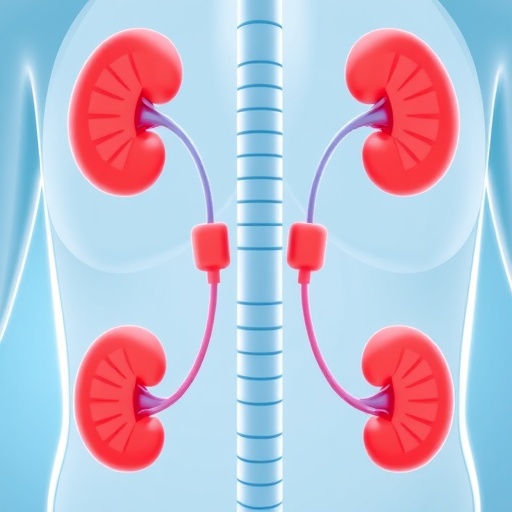A recent study conducted by Alemu, Narasimhan, and Alexander sheds light on the significant impact of semaglutide in managing kidney disease progression among patients who are grappling with type 2 diabetes and chronic kidney disease (CKD). This groundbreaking research, published in the Journal of General Internal Medicine, is particularly essential given the alarming rates of kidney failure among diabetic populations. The findings signal a paradigm shift in how clinicians approach the multifaceted interplay of diabetes management and renal health.
Current statistics paint a grim picture: millions of people with type 2 diabetes also face the grim specter of CKD. As the disease progresses, it elevates the risk of end-stage renal disease, necessitating dialysis or transplantation. Until now, treatment options have been limited in their effectiveness to mitigate this risk. However, the introduction of semaglutide represents a critical development by not only aiding in glycemic control but potentially altering the course of kidney disease progression.
The researchers undertook a comprehensive evaluation involving a diverse cohort of subjects aged 18 and older diagnosed with both type 2 diabetes and varying stages of chronic kidney disease. Through a rigorous design, participants were administered semaglutide and closely monitored for renal outcomes over the course of the study. The methodology involved sophisticated statistical analyses to ensure the reliability of the outcomes, providing a robust set of data for medical professionals to consider.
What sets semaglutide apart from traditional diabetes medications is its mechanism of action. Acting as a GLP-1 receptor agonist, semaglutide enhances insulin secretion in a glucose-dependent manner and suppresses inappropriate glucagon levels. This not only helps lower blood sugar levels but also facilitates weight loss, a crucial aspect for many diabetic patients. Importantly, the study observed that beyond these metabolic benefits, patients receiving semaglutide experienced a statistically significant reduction in the progression of CKD compared to those on standard treatment regimens.
In analyzing the results, the researchers noted improvements in renal function as measured by key biomarkers, including estimated glomerular filtration rate (eGFR) and albuminuria levels. Such enhancements are critical, as preserving kidney function can lead to better overall health outcomes and reduced healthcare costs associated with advanced kidney disease treatments. For patients, this means a potential decrease in the necessity for more aggressive interventions down the line.
Moreover, the researchers highlighted that semaglutide was generally well tolerated, with a side effect profile similar to that seen in its use for glycemic control. This includes gastrointestinal symptoms, which, while common, tend to be manageable for many patients. The implications of these findings extend beyond individual patient care; they suggest a need for a reassessment of treatment protocols for diabetes-associated kidney disease.
Patient education emerged as a paramount theme throughout the research. Effective communication about the benefits of semaglutide could empower patients to engage more actively in their healthcare decisions. For healthcare providers, this research paves the way for more informed discussions regarding treatment options that address the dual challenges of diabetes management and kidney preservation.
As we look to the future, the prospect of further studies aimed at understanding the long-term effects of semaglutide on kidney health holds great promise. The relationship between diabetes and kidney disease is complex, influenced by numerous factors ranging from genetics to lifestyle choices. Identifying and validating additional therapeutic agents that positively influence renal outcomes will be critical in the ongoing battle against this dual epidemic.
The clinical implications of this study cannot be overstated. These findings prompt a re-evaluation of how healthcare systems worldwide manage patients with type 2 diabetes at risk for chronic kidney disease. Recommendations for routine screening and early intervention could shift the trajectory for a significant number of individuals, ultimately improving quality of life and extending survival.
Furthermore, the economic burden of treating end-stage renal disease is immense. With healthcare costs skyrocketing, introducing effective treatments like semaglutide into clinical practice could lead to reduced expenditures associated with dialysis and kidney transplantation. This study underscores the importance of addressing chronic disease not only from a clinical perspective but also with an eye towards improving system-wide efficiency.
In light of these conclusions, healthcare policymakers are urged to consider integrating newer therapeutic options into standard care practices for diabetic patients. The evolving landscape of diabetes management necessitates guidelines that are continually updated to reflect emerging evidence from research. For those at the intersection of diabetes and kidney disease, these advancements could represent a turning point.
Overall, the findings presented in this study herald a significant advancement in our understanding of the interplay between diabetes treatment and kidney health. Semaglutide not only contributes to improved glycemic control but also showcases the potential to alter the course of kidney disease progression. As research continues to unfold, the hope is that these developments will catalyze more personalized and effective health strategies for vulnerable populations.
In conclusion, the intersection of type 2 diabetes and chronic kidney disease presents unprecedented challenges, but with the innovative research emerging, there is hope. Semaglutide’s role in reducing kidney disease progression signifies not just a potential therapeutic breakthrough but a necessary shift in how we approach multi-faceted chronic diseases. The future holds promise, and continued investigation into novel treatments will be vital in safeguarding the health of millions.
Subject of Research: Semaglutide and Kidney Disease Progression in Type 2 Diabetes
Article Title: EBM BLS: Semaglutide Reduces Kidney Disease Progression in Patients with Type 2 Diabetes and Chronic Kidney Disease
Article References:
Alemu, L.S., Narasimhan, S. & Alexander, J.T. EBM BLS: Semaglutide Reduces Kidney Disease Progression in Patients with Type 2 Diabetes and Chronic Kidney Disease. J GEN INTERN MED (2025). https://doi.org/10.1007/s11606-025-09906-8
Image Credits: AI Generated
DOI: https://doi.org/10.1007/s11606-025-09906-8
Keywords: Semaglutide, Type 2 Diabetes, Chronic Kidney Disease, GLP-1 receptor agonist, renal health, glycemic control, kidney disease progression.




